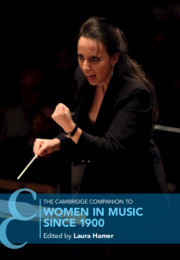Book contents
- The Cambridge Companion to Women in Music since 1900
- Cambridge Companions to Music
- The Cambridge Companion to Women in Music since 1900
- Copyright page
- Dedication
- Contents
- Figures
- Boxes
- Notes on Contributors
- Preface
- Abbreviations
- Part I The Classical Tradition
- 1 Women in Composition before the Second World War
- 2 Women in Composition during the Cold War in Music
- 3 Behind the Iron Curtain: Female Composers in the Soviet Bloc
- 4 Still Exceptional? Women in Composition Approaching the Twenty-First Century
- 5 On the Podium: Women Conductors
- 6 Soloists and Divas: Evolving Opportunities, Identity, and Reception
- In Her Own Words: Practitioner Contribution 1
- Part II Women in Popular Music
- Part III Women and Music Technology
- Part IV Women’s Wider Work in Music
- Appendix: Survey Questions for Chapter 14, The Star-Eaters: A 2019 Survey of Female and Gender-Non-Conforming Individuals Using Electronics for Music
- Select Bibliography
- Index
- References
4 - Still Exceptional? Women in Composition Approaching the Twenty-First Century
from Part I - The Classical Tradition
Published online by Cambridge University Press: 17 April 2021
- The Cambridge Companion to Women in Music since 1900
- Cambridge Companions to Music
- The Cambridge Companion to Women in Music since 1900
- Copyright page
- Dedication
- Contents
- Figures
- Boxes
- Notes on Contributors
- Preface
- Abbreviations
- Part I The Classical Tradition
- 1 Women in Composition before the Second World War
- 2 Women in Composition during the Cold War in Music
- 3 Behind the Iron Curtain: Female Composers in the Soviet Bloc
- 4 Still Exceptional? Women in Composition Approaching the Twenty-First Century
- 5 On the Podium: Women Conductors
- 6 Soloists and Divas: Evolving Opportunities, Identity, and Reception
- In Her Own Words: Practitioner Contribution 1
- Part II Women in Popular Music
- Part III Women and Music Technology
- Part IV Women’s Wider Work in Music
- Appendix: Survey Questions for Chapter 14, The Star-Eaters: A 2019 Survey of Female and Gender-Non-Conforming Individuals Using Electronics for Music
- Select Bibliography
- Index
- References
Summary
Chapter 4 discusses the situation of contemporary female composers and poses the question of the extent to which they are ‘still exceptional’. Ranging across a wide range of figures, Astrid Kvalbein considers how contemporary women, such as Kaija Saariaho, Jennifer Walsh, and Lotta Wennäkoski, explore feminist themes and provide gender critiques through their works; the tendency for women, including Judith Weir, Olga Neuwirth, and Du Yun, to engage with wider societal issues; the strategies women, such as Unsuk Chin, Gabriela Lena Frank, and Liza Lim have adopted to respond to an increasingly globalised world; and how composers such as Natasha Barrett and Jana Winderen have explored environmental issues through their music.
Keywords
- Type
- Chapter
- Information
- The Cambridge Companion to Women in Music since 1900 , pp. 48 - 63Publisher: Cambridge University PressPrint publication year: 2021



